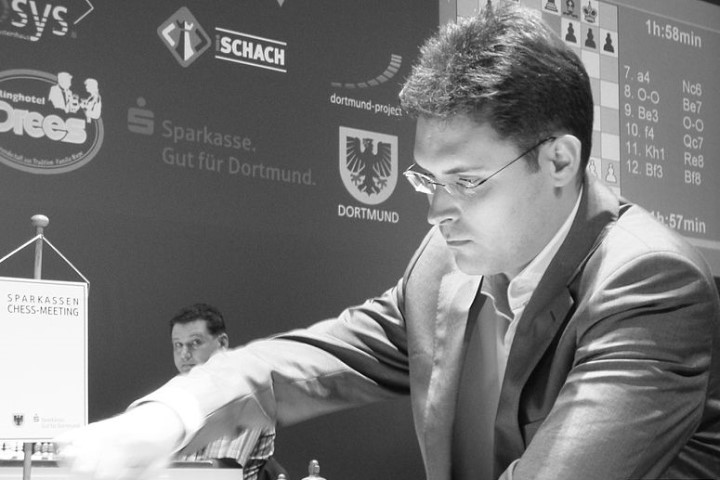


ChessBase 17 - Mega package - Edition 2024
It is the program of choice for anyone who loves the game and wants to know more about it. Start your personal success story with ChessBase and enjoy the game even more.
The long-standing Dortmund super-tournament had taken place yearly since 1973, with some big names getting first place before the 27th edition in 1999 — the list of winners includes Ulf Andersson, Vlastimil Hort, Zoltan Ribli, Effim Geller, Anatoly Karpov and Garry Kasparov. Even when the chess world was split in two, the traditional German event stood its ground and gathered a strong line-up year after year.
Master Class Vol.11: Vladimir Kramnik
This DVD allows you to learn from the example of one of the best players in the history of chess and from the explanations of the authors (Pelletier, Marin, Müller and Reeh) how to successfully organise your games strategically, consequently how to keep y
The participants of the 27th edition were Viswanathan Anand (2771), Vladimir Kramnik (2760), Michael Adams (2708), Peter Leko (2701), Anatoly Karpov (2700), Veselin Topalov (2690), Ivan Sokolov (2656) and Jan Timman (2650). Note that at the time only around ten to twelve players had a rating over 2700 points, with Garry Kasparov dominating the world ranking with an astronomical 2851 — see full ratings list from July 199 here.
Leko had become the youngest-ever grandmaster back in 1994, when he got the title at the age of 14 years, 4 months and 22 days. At 19, he was still considered a prodigy, according to the standards of the time. The other player that was making a name for himself as a blooming youngster was Alexander Morozevich, who was two years older than Leko and already had reached the fourth spot in the world rankings.
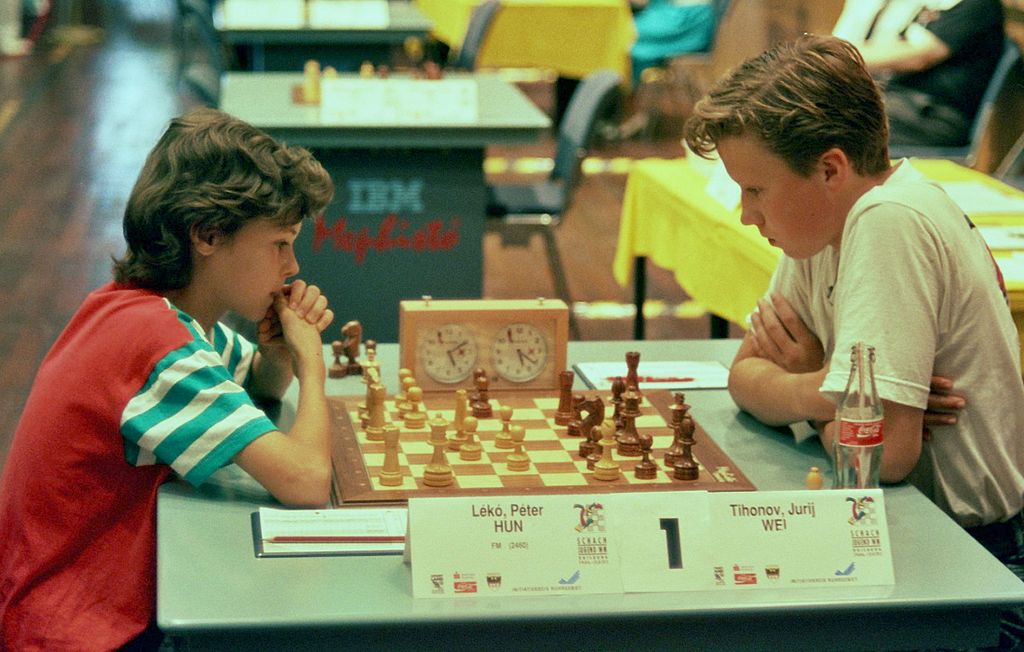
Peter Leko and Jurij Tihonov at the World Youth Chess Championship 1992 in Duisburg | Photo: Gerhard Hund
Kramnik came from winning the last four editions. In fact, since his debut in Dortmund in 1993, he had not lost a single game — he did not lose in 1999 either and would only give up a full point in 2000, against Mickey Adams. Leko, on the other hand, had played in all but one editions since 1994, finishing in last place twice and getting third and fourth positions in his remaining outings.
In addition to winning the tournament, Leko met his future wife at the event — Sofia, the daughter of Armenian grandmaster and Leko's trainer Arshak Petrosian.
The tournament was an eight-player single round robin. In the end, 11 out of 28 games were decisive, with most of the field showing great opening preparation and willingness to enter theoretical discussions in the topical openings of the time.
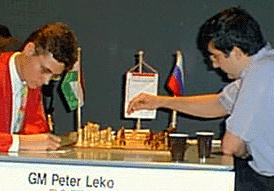
Defending champion Kramnik was paired up against the eventual tournament winner with the black pieces in round one. The Russian played the Petroff and held his young opponent to a draw in 26 moves.
Two consecutive wins followed for Leko. First, with Black against Topalov. The Bulgarian, true to his style sacrificed a piece for two pawns and a dangerous attack, but Leko showed great nerves and strong calculation abilities to neutralize his opponent and score the only win of round two. With this victory, he joined Karpov and Adams in the lead.
Leko's third opponent was co-leader Mickey Adams. The Englishman employed the Marshall Attack, but was caught by surprise by White's fifteenth move. When it was clear Black did not have much of an attack, Leko went on the offensive and won the game in style:
White played the good-looking 24.Bg5. There followed 24...Rd7 25.Re1 Qb6 26.Re2 Kh7 27.Rh4 a5, and then came the final blow:
Black Repertoire against 1.e4 Vol. 1: The Marshall Attack
The Marshall Attack is one of the most dynamic replies Black has at his disposal against 1.e4. At the cost of a pawn, Black takes over the initiative from the get - go and goes after the white king. Wrongly considered to be mainly a drawing weapon by some, this DVD offers many new ideas for Black, showing how to keep the queens on the board and to play for a win in almost all cases.
28.Bxh6 Qxh6 29.Qg5 (pinning Black's queen) a4 30.Re6, and Black resigned.
Going into the only rest day of the event, Leko was leading the event on 2½ out of 3, with Karpov and Anand — who beat Timman in round three — a half point behind. The Hungarian would not lose the sole lead until the end of the event.
After the free day, Kramnik came prepared to overcome the youngster and fight to get his fifth straight triumph at the third-largest city of North Rhine-Westphalia. 'Big Vlad' got back-to-back wins over tailenders Timman and Topalov, but could never catch up with Leko, as he also won in round five to keep his half-point lead. His third victim of the event was Timman, who went for a sharp alternative out of a Petroff Defence:
The Petroff (or Russian) Defence which is characterised by the moves 1.e4 e5 2.Nf3 Nf6 has been popular at the highest levels for many years and enjoys the reputation of being an extremely solid defence.
By playing 10...Qd6 on the previous move, Timman knew that he needed to respond to 11.Nfd2 with 11...0-0-0 (in the diagrammed position). Leko then had 12.f3, gaining a piece, but lacking development on the queenside. Much like in his win over Topalov, the 19-year-old showed good defensive skills to fend off Black's attack and ended up prevailing thanks to his material advantage.
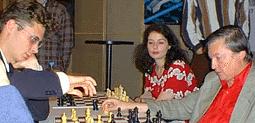 Leko had maintained his place atop the standings, but had 'Mr. Dortmund' a half point behind. In round six, he faced his third Petroff of the tournament, this time against Karpov, who comfortable held the draw. Meanwhile, Kramnik split the point with Adams.
Leko had maintained his place atop the standings, but had 'Mr. Dortmund' a half point behind. In round six, he faced his third Petroff of the tournament, this time against Karpov, who comfortable held the draw. Meanwhile, Kramnik split the point with Adams.
In a rather uneventful final round, Leko drew Sokolov from the black side of a Gruenfeld Defence — it was the first time he had faced 1.d4 in all the event. Kramnik also drew, so Leko got tournament victory without needing tiebreaks. His tournament rating performance? 2863.
| # | Name | Rating | Points | TPR |
| 1 | Peter Leko (Hungary) | 2701 | 5 | 2863 |
| 2 | Vladimir Kramnik (Russia) | 2760 | 4½ | 2798 |
| 3 | Anatoly Karpov (Russia) | 2700 | 4 | 2755 |
| 4 | Viswanathan Anand (India) | 2771 | 4 | 2745 |
| 5 | Michael Adams (England) | 2708 | 4 | 2754 |
| 6 | Ivan Sokolov (Bosnia and Herzegovina) | 2656 | 2½ | 2609 |
| 7 | Veselin Topalov (Bulgaria) | 2690 | 2 | 2548 |
| 8 | Jan Timman (Netherlands) | 2650 | 2 | 2554 |
This was only the first of three triumphs in Dortmund for Leko. Most notably, three years later, when the tournament served as the Candidates Tournament to find Kramnik's challenger for the next World Championship match, Leko got the coveted ticket by beating Topalov in the final. The match played in Brissago finished tied, which, according to the regulations, meant the defending champion kept his title.
Leko continued to participate in the German tournament until 2011, getting his third win in 2008, when a closely contested edition meant 'plus two' was enough to get clear first. Vassily Ivanchuk, Shakhriyar Mamedyarov, Jan Gustafsson and a very young Ian Nepomniachtchi finished a half point behind.
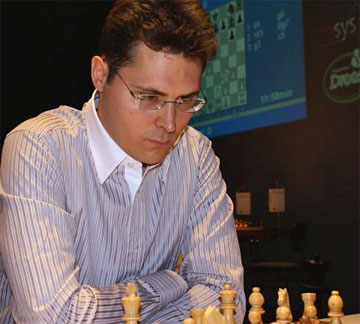
Leko at the 2008 edition | Photo: Dagobert Kohlmeyer